初中英语八大时态总结 PPT
合集下载
初中英语八种时态讲解-课件PPT
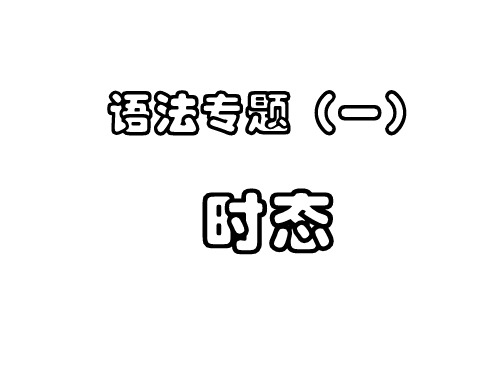
什么情况下用?
①表示经常或习惯性的动作或存 在的状态。②表示主语通常的能 力、兴趣爱好、和性格特征。③ 表示客观的事实或真理。④表示 按照时刻表或已经计划安排好的 将来行为。(只限于是go, come, leave, arrive, begin, start, take off, stop, be等表示开始或移动意义的 词。)⑤在时间状语从句和条件 状语从句中,主句用一般将来时 (will+动词原形),从句中用一般
变“y”为“i”再加-ed
worry→worried
cry→cried
1. He____(be, was, were, been) here a moment ago. 2. They ____(be, was, were, been) here just now. 3. The scientists _____(leave, leaves, leaved, left) for America yesterday. 4. Last week we ______(visit, visited ) the Science Museum. 5. When I was a child, I often ____(play, played) football. 6. The students ran out of the classroom as soon as the bell ____(ring, rang, rung).
一般过去时
概念:过去某个时间里发生的动作或 状态;过去习惯性、经常性的动作、 行为。 时间状语:ago, yesterday, the day before yesterday, last week(year, night, month…), in 1989, just now, at the age of 5, one day, long long ago, once upon a time, etc. 基本结构:①be动词;②行为动词 否定形式:①was/were+not;②在行为 动词前加didn't,同时还原行为动词。 一般疑问句:①was或were放于句首; ②用助动词do的过去式did 提问,同时 还原行为动词。
中考英语总复习之八大时态(共23张PPT)
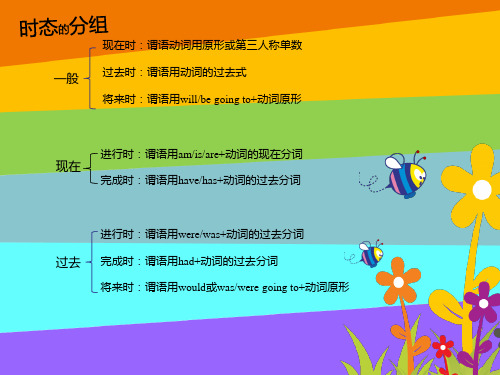
was I _____sad yesterday because I didn’t have my breakfast.
动词原形
过去式
got went ate did said
过去分词
gotten gone eaten done said
get
go eat do say take give come buy
e.g. 他刚刚才到家。 e.g. 我今早六点就醒来了。
arrived at home just now. He _______ woke up at six this morning. I __________
e.g. 昨晚当Evan睡着了他爸爸才回来。
came back. When Evan fall asleep his father _______
e.g. 他每天早上七点起床。
gets up at 7 o’clock every day. He ______
sings in her bathroom. e.g. Leif经常在他的厕所唱歌。 Leif always ______
② 表示客观真理、事实、人的技能或现在的状态,一般不加状语。
e.g. 地球绕着太阳转。
④ 在时间状语从句中(以when, after, before, while, until, as soon
as等引导)和条件状语从句中(以if,unless引导),
用一般现在时代替一般将来时,句子中可以有将来时间。
e.g. 请你一到澳大利亚就给我打电话。
arrive in Australia. Please ring me as soon as you ______
用一般现在可以表达将来,句子中可以有将来时间。 e.g. 开往厦门的火车将会在早上八点出发。
初中英语八大时态-讲解ppt课件
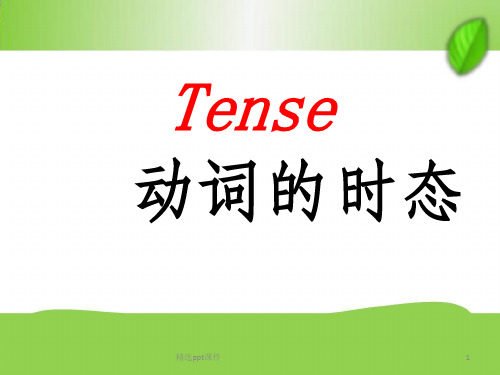
D.have;left
精选ppt课件
18
六、过去将来时
1.用法:从过去看将要发生的动作。
2.结构:would was/were/going to +v.(原型)
例题
1.--What did he say yesterday?
--He said he____to Sydney next week.
A.goes B.will go
在有关的过去动作用现在完成,与现在 无关的过去动作用一般过去。)
4.易错点:
1 have gone to+地点,表示“去了某地”。
(人已走,尚未回。只用于第三人称。)
They have gone to Europe.
(They are not here.)
精选ppt课件
22
2 have been to+地点,表示“去过某
C.would go D.are going
2.--Did your son fail his English exam once again?
--Yes, but he told me he____hard next term.
A.studies B.is studying C.wil--When____we have the meeting? ---At 8.
A.are B.shall
C.would D.will
4.--When___you___for London? --Next week.
A.will;leaving
B.are;leaving
C.shall;leave
A.are work
B.are worked
C.work
初中英语八大时态-讲解ppt课件
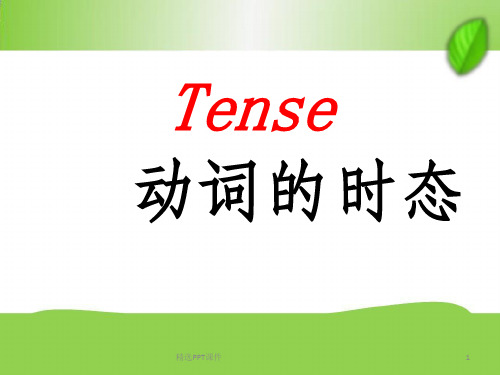
例题
Li Ming didn’t understand what American people
said,_____?
A.couldn’t he
B.could he
C.didn’t he
精选PPT课件 D.did he
8
三、现在进行时
1.用法:
A.现刻动作:目前正在发生的动作。
B.现阶段动作:目前一个时期一直在进行的 动作,此刻不一定在进行。
I have worked.
I had worked.
精选PPT课件
5
•各种时态的用法
精选PPT课件
6
一、一般现在时
1.用法:A.现在经常性的动作或状态 B.客观事实和真理。
2.标志词:always, usually,often, sometimes, never, every day /week /month/year/…
例句:I am working.
例句:I was working.
精选PPT课件
3
一般将来时, 将 will加原型。 来 过去将来时,
would加原型。
I will work.
I would work.
精选PPT课件
4
完 成
现在完成时, have/has加过分。 过去完成时,
时 had 加过分。
tomorrow,in three days,in (the)
future,next week/month/term…,
from now on 精选PPT课件
14
4.shall/will/be going to之间的区别:
shall往往用于第一人称疑问句, will可用于任何人称。
英语八大时态PPT课件(详细版)

b
15
He is a lazy man . He ____the dirty jeans every day.(2014 )
A. always wears B. always wearing C. always to wear D. is always wearing
You will know the truth after you ___him.(2013) A. see B. will see C. are seeing D.to see
b
16
三、一般过去时
1、构成 一般过去时用动词的过
去式表示。除系动词be的过去式 有人称和数的变化外,其他动词 的过去式无人称和数的变化。
b
17
2、用法
※表示过去已经发生的动作,现在 已经结束,常与相应的过去时间状 语连用。 Tom fell ill last night , and he had to stay at home.
【翻译】
我今年20岁,住在北京。 I am twenty years old this year , and I live in Beijing.
火车将在一个小时后(in an hour)出发(set off)。 The train sets off in an hour.
她每天都走路上学。 She walks to school every day. 或:She goes to school on foot every day.
If it doesn’t rain tomorrow,we’ll
go shopping.
பைடு நூலகம்
b
6
常与一般现在时连用的时间状语有:
often 经常
英语八大时态PPT课件(详细版)
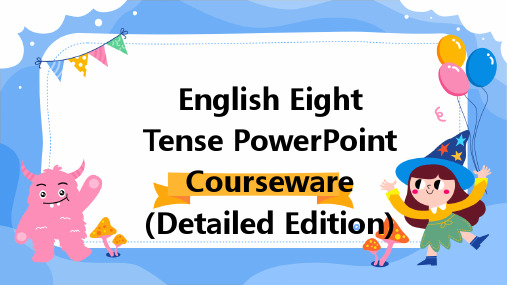
come)
The perfect tense is formed by combining the presentation
particles of the verb with have or has (e.g., he has gone, she has come)
The Composition of the Eight Tenses in English
03
Examples
I have studied, They have played, He has written
Present simple tense
Definition
The present simple tense is used to express an action that is verbal, generic, or not emphasizing time
VS
Tense can be classified into two categories: simple tense and complex tense Simple tense includes present, past, and future tense, while complex tense includes the perfect, the superior, the future perfect, and the conditional perfect tense
Conditional Perfect Tense
It is used to express actions or events that would have been completed in the past if a condition had been met
The perfect tense is formed by combining the presentation
particles of the verb with have or has (e.g., he has gone, she has come)
The Composition of the Eight Tenses in English
03
Examples
I have studied, They have played, He has written
Present simple tense
Definition
The present simple tense is used to express an action that is verbal, generic, or not emphasizing time
VS
Tense can be classified into two categories: simple tense and complex tense Simple tense includes present, past, and future tense, while complex tense includes the perfect, the superior, the future perfect, and the conditional perfect tense
Conditional Perfect Tense
It is used to express actions or events that would have been completed in the past if a condition had been met
初中英语八种时态归纳PPT
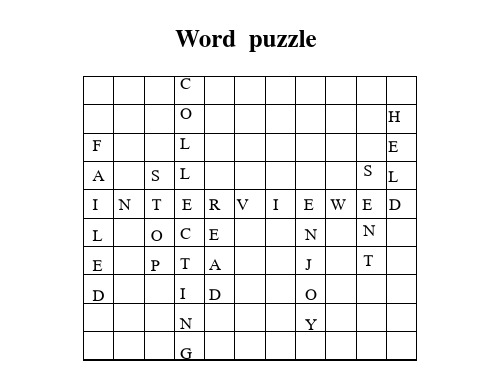
10. About 400 years ago, Galileo proved that the earth travels (travel) around the sun.
Part B 语态
Active Voice
Passive Voice
主动语态
1. Many people speak English.
At the party.
--- I _l_ik_e___ your jacket, Tim. How long _h_a_v_e_y_o_u__h_a_d__ it?
Oh…er… I __b_o_u_g_h_t__it last week. W__o_u_l_d_y_o_u__li_k_e_ to dance, Becky? ---Phew. It’s __h_o_t__ here. --- Put your jacket on the chair. You ____n_e_e_d_n’wt orry. It’ll be ok. ---That’s _b_e_tt_e_r __.
8. Mr. Green and his wife had lived (live) in London for a few years before they came (come) to work in China in 2001.
9. He said he w__o_u_ld__n_o_t_s_p_e_a(k not,speak) at the meeting the next day.
4. Hurry! Your classmates _a_r_e_w__a_it_i_n_g(wait) for you in the classroom..
1. This is the third time you _h_a_v_e__b_e_e_n__(be) here.
Part B 语态
Active Voice
Passive Voice
主动语态
1. Many people speak English.
At the party.
--- I _l_ik_e___ your jacket, Tim. How long _h_a_v_e_y_o_u__h_a_d__ it?
Oh…er… I __b_o_u_g_h_t__it last week. W__o_u_l_d_y_o_u__li_k_e_ to dance, Becky? ---Phew. It’s __h_o_t__ here. --- Put your jacket on the chair. You ____n_e_e_d_n’wt orry. It’ll be ok. ---That’s _b_e_tt_e_r __.
8. Mr. Green and his wife had lived (live) in London for a few years before they came (come) to work in China in 2001.
9. He said he w__o_u_ld__n_o_t_s_p_e_a(k not,speak) at the meeting the next day.
4. Hurry! Your classmates _a_r_e_w__a_it_i_n_g(wait) for you in the classroom..
1. This is the third time you _h_a_v_e__b_e_e_n__(be) here.
英语时态8种基本时态讲解ppt课件

• c)----He joined the army in 1990. • -----He didn’t joined the army in 1990. • -----Did he join the army in 1990? • -----Yes ,he did ./No ,he didn’t.
认识到了贫困户贫困的根本原因,才 能开始 对症下 药,然 后药到 病除。 近年来 国家对 扶贫工 作高度 重视, 已经展 开了“ 精准扶 贫”项 目
4.过去将来时
• 过去将来时是立足于过去某时,从 过去的观点看将要发生的动作或状 态。主要用于宾语从句中。
认识到了贫困户贫困的根本原因,才 能开始 对症下 药,然 后药到 病除。 近年来 国家对 扶贫工 作高度 重视, 已经展 开了“ 精准扶 贫”项 目
• c)以辅音字母+y结尾的单词变y为i加 -es.
• Study---studies carry-carries • d)以元音字母+y结尾的单词直接加-s. • play---plays stay---stays
• 句型结构:主语+will/shall+V.原形 +…(第一人称用shall)
• I shall go to Shanghai tomorrow. • They will have a meeting next week. • ----She will be 20 years old.
认识到了贫困户贫困的根本原因,才 能开始 对症下 药,然 后药到 病除。 近年来 国家对 扶贫工 作高度 重视, 已经展 开了“ 精准扶 贫”项 目
认识到了贫困户贫困的根本原因,才 能开始 对症下 药,然 后药到 病除。 近年来 国家对 扶贫工 作高度 重视, 已经展 开了“ 精准扶 贫”项 目
认识到了贫困户贫困的根本原因,才 能开始 对症下 药,然 后药到 病除。 近年来 国家对 扶贫工 作高度 重视, 已经展 开了“ 精准扶 贫”项 目
4.过去将来时
• 过去将来时是立足于过去某时,从 过去的观点看将要发生的动作或状 态。主要用于宾语从句中。
认识到了贫困户贫困的根本原因,才 能开始 对症下 药,然 后药到 病除。 近年来 国家对 扶贫工 作高度 重视, 已经展 开了“ 精准扶 贫”项 目
• c)以辅音字母+y结尾的单词变y为i加 -es.
• Study---studies carry-carries • d)以元音字母+y结尾的单词直接加-s. • play---plays stay---stays
• 句型结构:主语+will/shall+V.原形 +…(第一人称用shall)
• I shall go to Shanghai tomorrow. • They will have a meeting next week. • ----She will be 20 years old.
认识到了贫困户贫困的根本原因,才 能开始 对症下 药,然 后药到 病除。 近年来 国家对 扶贫工 作高度 重视, 已经展 开了“ 精准扶 贫”项 目
认识到了贫困户贫困的根本原因,才 能开始 对症下 药,然 后药到 病除。 近年来 国家对 扶贫工 作高度 重视, 已经展 开了“ 精准扶 贫”项 目
- 1、下载文档前请自行甄别文档内容的完整性,平台不提供额外的编辑、内容补充、找答案等附加服务。
- 2、"仅部分预览"的文档,不可在线预览部分如存在完整性等问题,可反馈申请退款(可完整预览的文档不适用该条件!)。
- 3、如文档侵犯您的权益,请联系客服反馈,我们会尽快为您处理(人工客服工作时间:9:00-18:30)。
含义:表示过去的某一 时刻正在进行的动作。 例如:昨天的这个时候 我正在上课呢。
含义:表示动作已经完 成,并强调对现在的影 响。概括为:“已经”、 “影响”。例如:我已 经做完作业了、我已经 吃过饭了。
大家有疑问的,可以询问和交流
可以互相讨论下,但要小声点
含义:有两个过去时,其中一 个过去时比另一个过去时还要 过去,即一个动作发生在“过 去的过去”。 例如:昨天下
我现在正 在踢足球。
现在进行时
昨天的这个时候 我正在踢足球。
过去进行时
我已经踢完足球了。
现在完成时
一般现在时 一般现在时,在没有be动词和助动词have,has,
或情态动词的情况下,要变为否定句或疑问句 的时候要借用助动词do或者does。
肯: I work here.
否: I don’t work here.
问:Do you work here?
答: Yes, I do./ No, I don’t.
一般过去式
肯: I worked here. 否: I did’t work here. 问:Did you work here? 答:Yes, I did./ No, I didn’t.
一般将来时
肯: I wil work here. 否: I will not work here. 问, I won’t.
过去进行时
肯: I was working here. 否:I was not working here. 问:Were you working here? 答:Yes, I was./ No, I wasn’t.
现在完成时
肯: I have worked here. 否:I have not worked here. 问:Have you worked here? 答:Yes, I have./ No, I haven’t.
一般过去将来时
肯: I woud work here. 否:I would not work here. 问: 答:
现在进行时
肯: I am working here. 否:I am not working here. 问:Are you working here? 答:Yes, I am./ No, I am not.
1. 一般现在时 2. 一般过去时 3. 一般将来时 4. 一般过去将来时 5. 现在进行时 6. 过去进行时 7. 现在完成时 8. 过去完成时
含义: 表达的是一个 经常性的反复性的动 作或普遍真理。 比如: 我在这工作、我爱吃
苹果、等等。
含义:过去发生的动 作或事情。例如:我 过去在这工作、我见 过她、我吃了一个苹 果。
过去完成时
肯:I had worked here. 否:I had not worked here. 问:Had you worked here? 答:Yes, I had./ No, I hadn’t.
我经常踢足球。
一般现在时
我昨天踢足球了。
一般过去时
两星期前我说 过我将踢足球。
一般过去将来时
午我走进教室的时候同学们早 就坐好了、昨天当我走进电影 院的时候电影早就开始了。·
1. 一般现在时
三单s,es其它无变化。
2. 一般过去时
词尾加ed。
3. 一般将来时
will 加原型。
4. 一般过去将来时 would 加原型。
5. 现在进行时 6. 过去进行时 7. 现在完成时 8. 过去完成时
am/ is/ are +ing。 was/ were +ing。 have/ has + ed。 had + ed。
含义:将来要发生的动 作或状态。 例如:我
将在这工作、我将与她 见面、我将吃掉一个苹 果。
含义:站在过去谈论将 要发生的事情。 例如:
一个月以前我说过,我 将要来长沙工作。 两个
星期前我说过,我将要 与她见面。
含义:表示此时此刻正 在发生的动作,也可以 表示现阶段正在发生的 动作。例如:我正在工 作。我正在学习。
